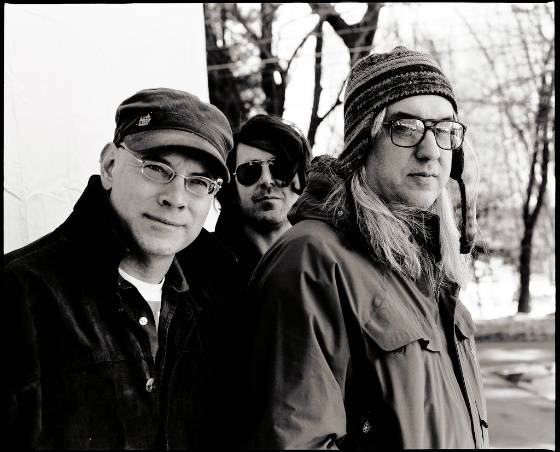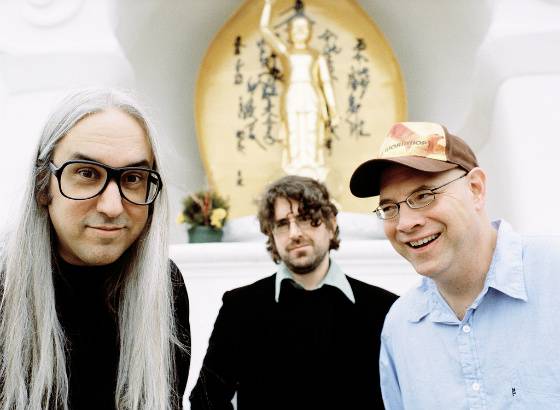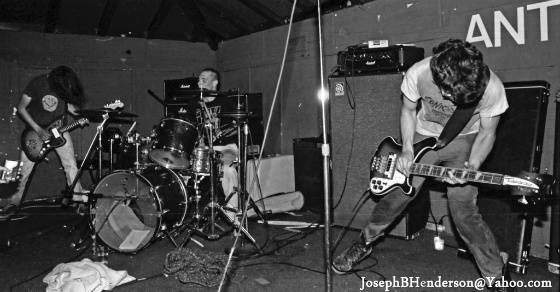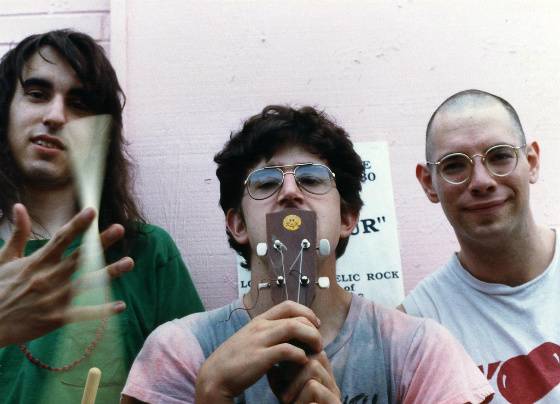There’s just no way to fully comprehend a band like Dinosaur Jr. Has there ever been a musical project subjected to more turmoil, more influence, more emotional bondage, or more professional scarring than Dinosaur Jr. over the past 30 years? And would anyone else have been able to rise above all of that, to be one of the only pre-grunge alt rock bands still crafting relevant music? I can’t think of anyone who comes even close. Honestly, if you do, let me know in the comments.
For those that aren’t familiar with Dinosaur Jr., here’s a very quick recap of what the last 30 years have been like for J Mascis and the often-rotating cast of musicians he has enlisted to help him manufacture his influential sound:

J Mascis (lead singer, epic guitar player) and Lou Barlow (bass) formed the band Dinosaur during the early 80s in Amherst, MA after their high school hardcore punk band Deep Wounds broke up. Soon after, Emmett Murphy, aka “Murph,” joined to play drums. The three of them developed a unique style featuring lead guitar riffs that would help pave the way for a generation of slacker alt-rock kids. In 1985, they released their first album Dinosaur (and would later get sued over their band name and add the Jr.). Over the next three years they would tour with bands like Sonic Youth and release two more albums as a trio, You’re Living All Over Me (1987) and Bug (1988). On the surface, things seemed well and good, but it turns out J was a huge control freak. He enacted an artistic coup d’état of sorts, making sure Dinosaur Jr. was a reflection of his musical vision, to put it lightly. In 1989, after touring in support of Bug, Lou and J unleashed a feud of epic proportions. Lou was kicked out of the band by J and shortly after went on to reunite his former side project Sebadoh, another 90s alt-rock staple. After the feud, J enlisted a rotating cast of musicians to help him maintain the Dinosaur Jr. name. Things were never as great for Mascis as they were with Lou and Murph and he retired the name in the mid-90s.
Since that epically dysfunctional beginning, highlighted by J and Lou famously attacking each other on stage, the band decided to repair their wounds and — amplifying like only they can the adage that time heals all wounds — reform the original trio in 2005. Since then, they have continued to pump out relevant music filled with incredibly loud and washed out guitar noise. Just this past week they released their sixth album as a trio, and the third since their reunion, called I Bet on Sky.

How their reunion was not the epic and always-kind-of-sad swan song that most reunions are is beyond comprehension. If anything, their resurgent success speaks to the genius and the influence all three have had on modern rock music. Their washed-out riffs and stacks of amps — the same riffs that helped pave the way for many grunge slackers and the same amps that will fill the pockets of many an audiologist in the future — continue to demand recognition.
I Bet on Sky is easily recognizable as Dinosaur Jr. at their best, but what amazes me is the way it demonstrates the growth they have achieved over the past seven years since their reunion. The riffs on the opening track “Don’t Pretend You Didn’t Know” are classic Mascis, as are the distorted bass notes that ring throughout and the furious drum beats of Murph. But there is a sweetness, a lyrical sensibility, and most impressively, the album features two songs written and sung by Lou (that sound like classic Sebadoh songs if I may say so). These guys have clearly grown up, put their differences aside (as far as the music goes at least) and realized they are so much better together.
In preparation for the band’s live performance this Saturday at Pygmalion Music Festival, I put that theory to the test in a recent interview with drummer Murph. I hope your enjoyment of the interview matches the nervousness I felt while speaking with one of the founding members of a band that has clearly shaped the musical landscape of alt-rock and “indie” rock for longer than I have been alive.
Smile Politely: When you all patched things up and got back together in the mid-2000s, did you expect you would be here, three albums in?
Emmett “Murph” Murphy: No. With Dinosaur it’s always like we just do one album, one thing at a time. You know, we never really plan anything in the future and it never would surprise me, even now, if J was like, ‘Yeah, we did three albums in the beginning with the original lineup and now we have done three albums with the reunion.’ If next year he was ready to walk away, that wouldn’t surprise me at all.
SP: How do you interpret this latest stretch, from ’05 on? Do you consider this a second chance, a fresh start, or something else?
Murph: It was more like a chance to repair all of the dysfunction that happened in the early days. We left things kind of hanging and we all just went our separate ways so this was like a more … yeah, it was a chance to come back and heal the wound. And now we are stronger. Now we are just a stronger force because of that.
SP: How has that translated into a change in the songwriting, if at all?
Murph: It’s just sharper and better because we all know what we can … we know what we can pull off live, and now we are really aware of, you know, ‘will this song translate live as opposed to on the record.’ We are just more aware of how to write songs and make them sound better.
SP: What was the songwriting process like when you all were younger?
Murph: There was a little more jamming, but J still wrote the songs. The difference was we really didn’t think about how the songs would be translated. Now we really think about how this is going to sound on the radio and live. It’s hard to describe. We have more years listening now so we’re kind of more attentive, whereas before we just kind of put it out there. We didn’t care. We were just like, ‘whatever man, you’re either going to like it or hate it and we don’t really care.’

SP: What about your personal drumming style? How do feel like your time away from Dinosaur Jr. has helped you continue to grow as a drummer?
Murph: I’m actually in this weird growth spurt right now where I’m actually getting … I’m actually back where I was when I was younger. I’m playing all the time and I’m in this growth spurt where I’m just getting better. I don’t really know why [laughs].
SP: How do you compare I Bet on Sky to your most recent work?
Murph: I kind of feel like this is a poppier album. And J spent a lot more time on vocals and it shows. I think the vocals are a lot stronger on this record. I think it is more accessible, although I hate to say that word. Yeah, it’s poppier. Yeah, any artist, if you do something long enough you get better at your craft. You get more comfortable about what you are doing, and that’s how I feel about this record.
SP: Where do you think I Bet on Sky sits alongside the early work that really defined you all?
Murph: We’re just more mature now. Things are just more grown up or something. Back then, it was just more chaos and going into it with this whirlwind of energy. You don’t really know what you are doing, but you just do it. Now it’s a lot more methodical and you’re more Zen like. I know that sounds corny or cheesy, but you kind of know your job. Now we go in and we know what we have to do. It’s a lot clearer now.
SP: So the group dynamic is strong these days?
Murph: Yeah, we’re still developing our group dynamic actually. It’s still a work in progress, but we are hanging out a lot more, especially now that J and Lou have kids and family.
SP: Your break up is well chronicled, but did you all even spend a lot of time together in the early days?
Murph: I mean, not really. I remember we did a van drive one time for eight hours and we were in total silence. We didn’t talk the whole eight hours. Whereas now, well, I’m still the one who will break the silence. Even now it’s kind of like that, but I’m usually the one who will bring up something like, ‘Hey, Lou, you said you wanted to buy an amp in Toronto?’ And J will be like [stern deep voice], ‘Oh, they have really good Ampegs in Toronto, cheap.’ And then we will start a conversation [laughs].
SP: Take me back to 2007, the three of you are releasing a new album for the first time in nearly 20 years. What was that like for you? Was there more pressure that time around?
Murph: Eh, it wasn’t really pressure. We are what we are. We have a certain chemistry. We wouldn’t have done this reunion if we didn’t know it was going to be good. Not to boast, and I’m not saying that arrogantly, it’s just kind of like a marriage. It’s kind of like you get divorced and you meet your wife again and you go, oh maybe we should get back together and maybe we should do this again, and you know if you’re going to do it, it’s going to have to work. You just know.
SP: Well, there are so many reunion tours that go so horribly awry. So many bands that seem to force a reunion together for the income, and that can bring along a whole lot of doubt whenever bands make a move like this.
Murph: Yeah, a lot of them are really bad. We knew that if we were going to do this it was going to be good. We wouldn’t have done this if was going to be a second-rate Dinosaur or some, like, pushover whatever. We wouldn’t have done it. We would have said, ‘No, we aren’t doing this.’
SP: A lot of critics have credited you and, of course, bands like Sonic Youth, with really defining the alt-rock movement of the early 90s, looking back, how do you feel you made an impact?
Murph: Honestly, we don’t really think about that. People talk about that and I still meet people who, and lately that has been hitting us more, I meet people who are like, ‘Dude, I grew up in your drumming and blah blah blah.’ And I don’t really get it. Our impact is still, we’re still thinking Zeppelin, Hendrix, Sabbath, and so we are just kind of like, we are just kind of bewildered. It’s like, what, everyone didn’t grow up on Sabbath, Zeppelin, and Hendrix? Really? [laughs].

SP: You have a huge catalog now. Any songs from the old catalog you really love to still do live?
Murph: Yeah, I still love “Freak Scene.” Also, “In a Jar.” And we play “Raisin,” and um, “Just Like Heaven,” I love playing every night. We play “Forget the Swan” a lot. Yeah. Certain songs are great and I don’t get tired of playing them at all.
SP: So do you feel like this set you are taking out on the road is pretty spread across your whole discography?
Murph: Well that’s actually a discussion that we are having right now because if we include everything, we are basically going to start playing two-hour sets. We are getting to that point, so we are trying to kind of up the ante. In Italy, we actually did play a two-hour set, so we are getting to that point where we are like, ‘OK, let’s accept that we are going to play a really long set.’ We are debating. We are sifting through.
SP: In your long tenure you’ve now worked with just about every big indie label out there (Homestead, SST, Blast First in the 80s and Fat Possum and Jagjaguwar in the 00s). Are there any huge differences between the big indie labels from the 80s and today’s? Is it easier to be an “indie” band now?
Murph: Yeah. Now it’s more about what you can sell, what you can produce, whereas back then it was more about what you have and who are you as a band. They were more curious about your music, whereas now it’s more about whether we can sell your cd, are you accessible, and can we make money off of you. Back in the day, it was like, ‘You guys sound really weird and cool.’ The motivation wasn’t about money; it was about the art: ‘Oh, you guys are really different and weird.’ Unfortunately, the art … I mean, there are certain genres, and certain labels definitely deal with that, but it’s more about, overall, whether we can make money off of you.
SP: That clearly does something to the product.
Murph: Oh yeah. I know kids who start bands purely motivated by the fact that this is going to sound good on the radio. Or they will write these songs that are gonna be really accessible. It totally effects the way people write.
SP: What’s next for Dinosaur Jr.?
Murph: Right now we are totally focused on this record and this tour. J is not even thinking about it. We’ve never discussed or thought about something beyond this tour.
SP: Any tracks you have really fallen for on this latest album?
Murph: Yeah. We’ve kind of said that 1, 2, 8, and 10. Are our favorite tracks. (1: “Don’t Pretend You Know” 2: “Watch the Corners” 8: “What Was That” 10: “See It on Your Side”)








